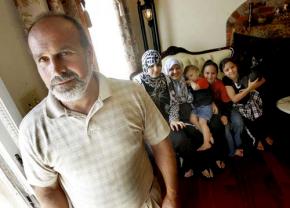The hope amid Katrina’s horrors
reviews the book Zeitoun by novelist Dave Eggers, the story of one man’s ordeal in the wake of Hurricane Katrina.
DAVE EGGERS' Zeitoun has been accumulating readers and awards for over a year now, but if you haven't picked it up yet, there could be no better time.
As we mark five years since the government's horrendous mishandling of Hurricane Katrina, and witness the disturbing Islamophobia accompanying the ninth anniversary of the "war on terror," Zeitoun offers an illuminating microcosm of both.
Zeitoun is the true story of how one immigrant's "American Dream" turned into a living nightmare. In 2005, Abdulrahman Zeitoun, known to most by his last name, ran a successful painting and contracting business with his wife Kathy in New Orleans, where they lived with their four children.
In the first part of the book we get to know and love the Zeitoun family. As Eggers said in an interview:
I was seeking to just tell a story about an all-American family that happens to be a Muslim. I wanted to sort of "de-exoticize" the idea of the Muslim-American family--to allow readers to learn about Kathy's conversion [to Islam] and see the functioning of a family that is exactly like their own. So a Christian reader can say, "Pretty much everything about that family is exactly like mine except I go to church and they go to a mosque."
I think storytelling has the power to sort of walk you through it, and put yourself in the shoes of another person...I think it's kind of startling that even though after 9/11 there has been this constant examination of Islam in the American media--"Who are Muslims? What do they want?"--and yet I think there is still an incredible amount of ignorance and misunderstanding.

It is this intimate connection to the family the author so effortlessly establishes that makes what happens to them all the more unbearable.
AS THE hurricane approached, Kathy and the kids left the city but Zeitoun stayed behind, as he had through countless other storms, to take care of his own property and that of friends and clients who had entrusted him with their keys.
When the levees broke, submerging the city in water, Zeitoun found another calling: being a hero. In the days following the storm, he paddled around the city in an aluminum canoe, rescuing stranded residents, feeding abandoned animals, and offering supplies and assistance to those in need.
The camaraderie and generosity shown by Zeitoun and other storm survivors was in marked contrast to the actions of government at all levels. Instead of aid, they sent guns: police, National Guard, Army, snipers, private mercenaries. Media reports fueled the hysteria with unsubstantiated claims of rape, looting and the general "animalistic tendencies" of (the mostly Black and poor) residents left behind.
Add to this the fact that FEMA was subsumed under the department of Homeland Security, and you begin to understand the toxic mix of circumstances for a man picked up for alleged looting who happened to be a Syrian immigrant.
Camp Greyhound, the Guantánamo-style open-air prison where Zeitoun was first held, is a perfect symbol of the twisted priorities which prevailed after the storm. It was built by prisoners from the Louisiana State Penitentiary in Angola. Eggers writes:
This complex and exceedingly efficient government operation was completed while residents of New Orleans were trapped in attics and begging for rescue from rooftops and highway overpasses. The portable toilets were available and working at Camp Greyhound while there were no working bathrooms at the Convention Center and Superdome a few blocks away. Hundreds of cases of water and MREs were readily available for the guards and prisoners, while those stranded nearby were fighting for food and water.
I'll let readers discover for themselves the Kafkaesque chain of events that unfolded for the Zeitoun family. If it doesn't make your blood boil, then you probably don't have a pulse. Many reading this book will doubtless be shocked that such a thing could happen in America.
Unfortunately, as many on the left know all too well, this is far from an isolated incident. The tragedy continues for countless others--from New Orleans residents still locked up or too poor to return home, to the countless innocent lives caught up in the racist "war on terror," to the victims of hate crimes stoked by the latest round of anti-mosque hysteria. The response to this year's earthquake in Haiti was, if anything, a more exaggerated horror show than that of Katrina.
Despite the tragic subject matter, the message of Zeitoun is ultimately a hopeful one, and a call to action. All of Eggers' proceeds from the book are being donated to the Zeitoun Foundation, which divides the money to various causes working to promote understanding of Muslim communities, exoneration of the unjustly incarcerated and the rebuilding of New Orleans.
Zeitoun's canoe perhaps provides an apt metaphor for the intersection of these causes: we are truly all in the same boat. Against a world in which fear, prejudice and militarism are paramount, the Zeitouns assert a common humanity.
We get a glimpse of this early on in the book, when the family receives a complaint about the implications of their company's rainbow logo:
Kathy wondered if her husband, who did not at that point have any gay friends or family members, might want to change the logo, to keep their message from being misconstrued. But Zeitoun barely gave it a thought...
"Think about it," Zeitoun laughed. "We're a Muslim couple running a painting company in Louisiana. Not such a good idea to turn away clients." Anyone who had a problem with rainbows, he said, would surely have trouble with Islam.
So the rainbow remained.


